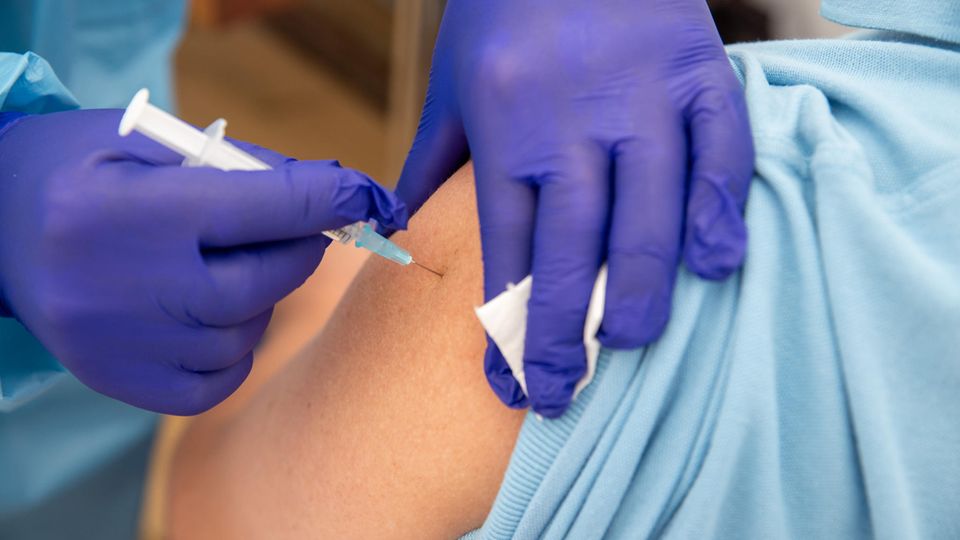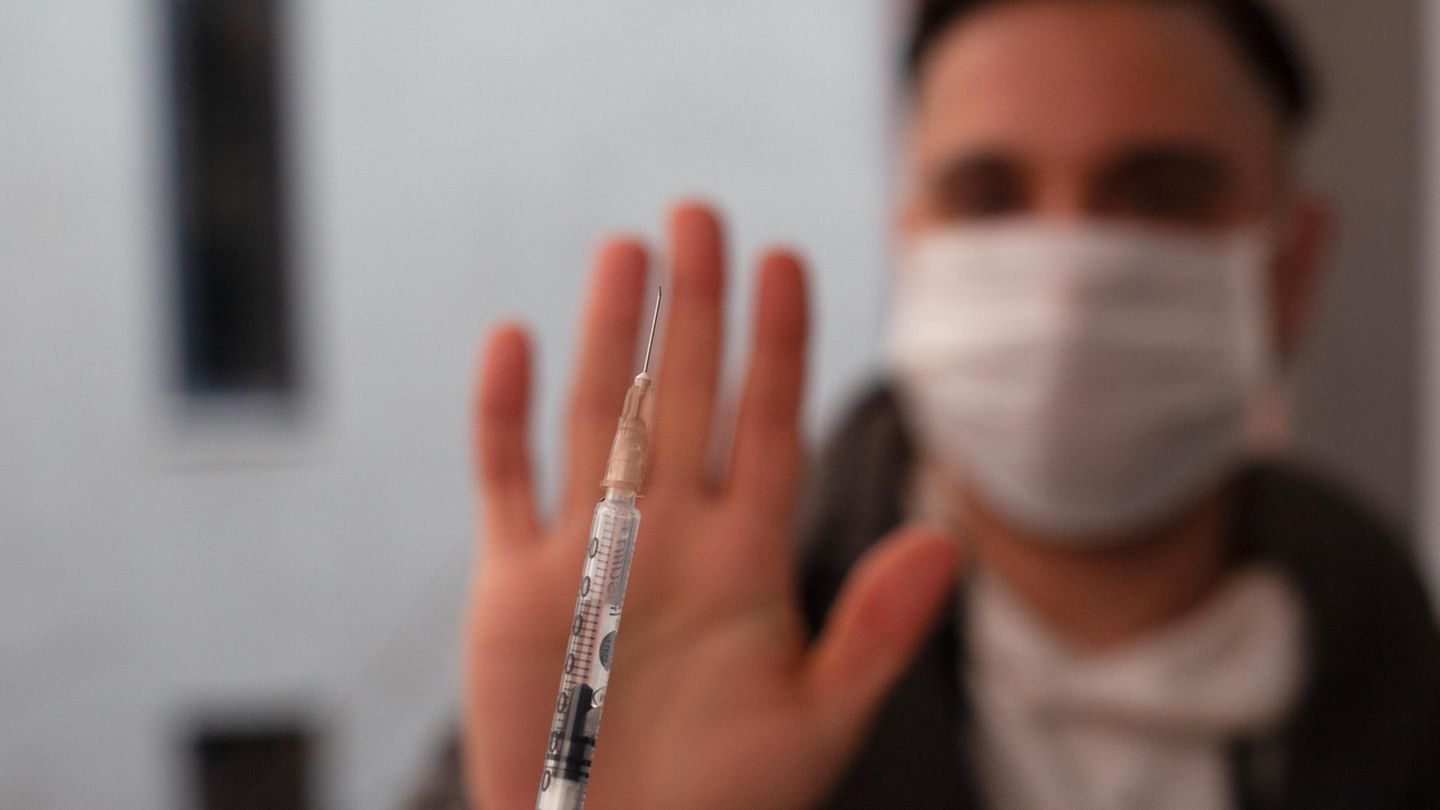In Germany, fewer and fewer corona vaccinations are carried out. Many who are still unvaccinated now generally do not want to be immunized. Among other things, you cite medical reasons – but which really speak against a vaccination?
The vaccination progress in Germany is experiencing a kind of summer slump, the demand has fallen sharply. For weeks there has been hardly anything going on in many vaccination centers in the country, and doctors in private practice also want less and less immunization against the corona virus. Millions of vaccine doses were last left lying around. Yet not all of them are vaccinated in Germany. Just over half of the population (54.8 percent) is fully immunized, 62.4 percent have received at least one dose.
According to surveys, many who have not yet tried to get a vaccination no longer intend to do so. Some still do not believe that an infection can harm them and consider the vaccination superfluous. Others cite safety concerns and do not trust the vaccines. Medical reasons are mentioned again and again. But who is actually affected by these? The Dortmund immunologist Carsten Watzl dared to explain in a Twitter thread.
What are the medical reasons against corona vaccination?
Watzl lists two groups of people for whom there are medical reasons against a Covid-19 vaccination. Children younger than 12 years. No corona vaccine has yet been approved for them. And people with known allergies to any of the ingredients. That’s it But what about pregnant women, autoimmune patients or people with coagulation disorders?
- Pregnancy: In Germany, vaccines are currently not recommended for pregnant women. Other countries have been vaccinating pregnant women for a long time, “without any problems,” said Watzl. Pregnant women can be vaccinated from the second trimester onwards.
The head of the gynecologists’ association, Christian Albring, also recommends such a vaccination. “Especially since the now widespread Delta variant, according to international reports, is associated with a high level of infectivity and an increased disease rate, in the opinion of the gynecological associations, a vaccination before and during pregnancy as well as in the puerperium and during breastfeeding makes sense,” he said the “editorial network Germany”. - Capillary leak syndrome: For Astrazeneca and Johnson & Johnson there is still the exclusion of people with capillary leak syndrome, writes Watzl, “but these people can be vaccinated with an mRNA vaccine”. Capillary leak syndrome, also known as Clarkson’s syndrome, is a very rare but potentially life-threatening disease with generalized edema.
- myocarditis: According to Watzl, previous heart muscle inflammations are no reason not to be vaccinated. Only if myocarditis has occurred after the first vaccination with an mRNA vaccine should no further mRNA dose be administered. “You could switch to a different vaccine here,” says the immunologist. Such post-vaccination myocarditis cases are “very rare,” it reported. According to this, 145 cases of myocarditis were found in the European Economic Area (EEA) in people who were vaccinated with the Biontech vaccine and 19 cases in people who were vaccinated with Moderna as of May 31. It is estimated that around 197 million mRNA vaccine doses have been administered in the EEA by then.
- Coagulation disorders / factor V diseases: According to Watzl, people who suffer from a coagulation disorder, i.e. a disease in which the blood cannot clot properly, do not have an increased risk of developing sinus vein thrombosis after vaccination with the vaccines from Astrazeneca or Johnson & Johnson (more on this here) , “because the mechanism is different”. The same applies to people with a factor V disease. Both diseases are no reason not to be vaccinated with one of the active ingredients.
- Autoimmunerkrankung: With every infection or vaccination there is a very rare risk that a flare-up will be triggered. It is no different with the COVID-19 vaccination, says Watzl. But that is not a “general vaccination exclusion”. An at the German Center for Immunotherapy, which was published in the “Annals of the Rheumatic Diseases”, came to the conclusion that people with autoimmune diseases tolerated the vaccination well and had fewer vaccine reactions than healthy people. However, according to the study, one in ten people vaccinated with Biontech did not develop antibodies. For such cases, booster vaccinations were discussed at an early stage, for example as cross-vaccination.
- Weakened immune system: For people with a weakened immune system, the vaccination is “not a higher risk,” said Watzl. However, it could be that the vaccination does not work so well for them, they may have to be vaccinated several times until adequate protection is available.
- Previous allergic reactions to vaccination: Even previous severe or allergic reactions to another vaccination are not excluded “in most cases”. Further explanations can be found in the.

Millions of vaccines are left lying around
The Cosmo study has been surveying around 1000 adults up to 74 years of age every two weeks since March 2020. In the survey in mid-July, 10 percent said that they certainly did not want to be vaccinated. In the group of unvaccinated respondents, they made up 41 percent. “If you compare the objectors with the rest of the unvaccinated, the objectors tend to have safety concerns and consider the vaccination superfluous because they do not perceive Covid-19 to pose a threat,” the study said. A lack of trust was also given by those who refused to vaccinate as the main reason for a survey by the polling institute Insa for “Bild am Sonntag”. There, the number of those who absolutely do not want to be vaccinated against Corona was even higher at 54 percent.
In the meantime, more than 1.35 million people in Germany were vaccinated against the coronavirus per day, currently there are around 355,600. The campaign has lost momentum. The result: there is more vaccine available than is currently in demand. As the “Welt am Sonntag” reported, the federal states are now planning to return at least 2.3 million broken cans to the central warehouse of the federal government. These are exclusively doses from vaccination centers, doctors are not allowed to return anything that has not been lying around. The federal government will then redistribute the vaccine. It is still open where and how. Germany has also promised that at least 30 million vaccine doses will be given away to third countries.
, , , , , ,




